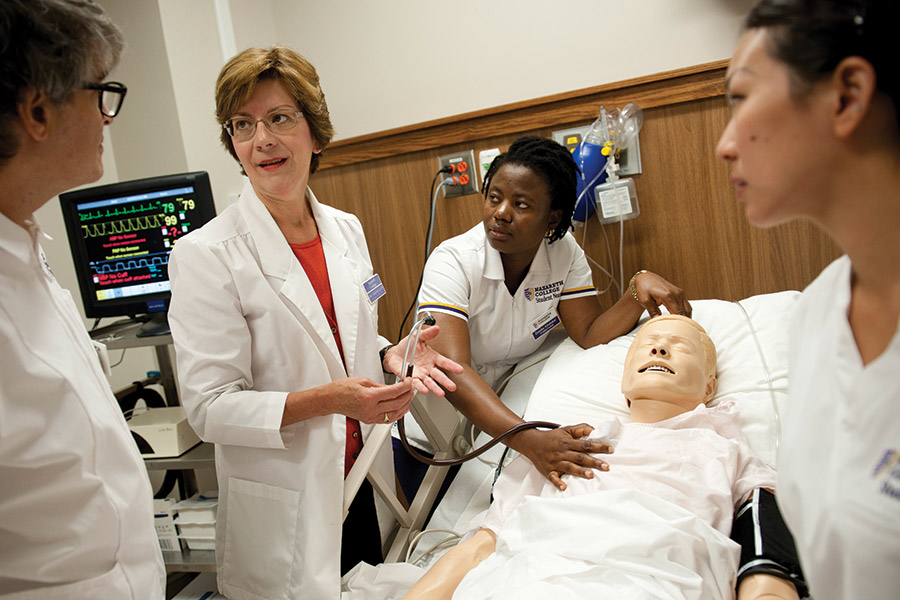ACADEMICS
Nursing Program Flourishes
New state-of-the-art facilities and a more rigorous curriculum have revitalized the long-standing program
by Joannie Eppinga

Reading about diseases and disasters is one thing. Walking into a room full of people who appear to be wounded and hysterical is another.
That’s why Nazareth’s simulation suite and skills lab, renovated in a revitalization of the nursing program, are important to students.
“They can now work in a real-life clinical setting,” says Professor and Chair in Nursing Jeanine Santelli, Ph.D. In the real world, she says, “nursing students get knocked out of the way” as professionals rush in. But in the simulation suite and the skills lab, students get to decide whom to treat and how to proceed—and the practice areas are larger and better equipped because of a recent $3.5 million renovation. Brigid Noonan, Ph.D., dean of the School of Health and Human Services, is thrilled. “The new facilities match the quality of a Nazareth education,” she says, “and they allow faculty and students to focus on their preparation.”
In addition, the new facilities let students practice fundamental skills before they go out into hospitals. Last semester the program ran a simulation of a multi-vehicle accident. Santelli says, “Students walked into ‘the ER.’ Some ‘patients’ were bleeding, some were dead, others couldn’t breathe. Who’s the priority? What needs to happen?” The scenario pulled students’ skills together and taught them about their own responses to medical turmoil.
“Students are really excited,” Santelli says. “The biggest tell that we’ve done something amazing is that they’re now clamoring for more open lab time.”
Students are also enjoying several new collaborative spaces where they can study or relax. Walls have white boards, and tables include cord ports so students can plug in and work collaboratively on a big screen. “It’s gratifying to see them using the space the way I’d envisioned,” Santelli says.
The transformation goes beyond upgrading the physical structures. Now the program offers a reformatted, user-friendly bachelor’s degree program for working nurses. Classes are every other weekend, a pattern that complements hospital shift scheduling. “Someone going through it full time should finish in about 16 months,” Santelli reports.
Applications to the nursing program are up, thanks partly to rising test scores. “When I inherited the program in 2011, we set a goal of raising our scores on the national licensure test,” Santelli notes. “We’re now at 94%.” Several changes contributed to the increase. Expectations of students were clarified, faculty tightened up curriculum, a required chemistry course was included to ensure that applicants felt capable in science, and a mandatory review class was added. The result of a more rigorous curriculum? More dedicated applicants, and a more selective program.
Quality nursing applicants are also drawn to Nazareth, Santelli says, by what sets the program apart: an emphasis on transcultural nursing. That includes “knowing that the culture from which people come influences their health-care decisions. It’s having an awareness of their perspective and then sensitively helping to bridge any gaps.”
The program is now strong, but, Santelli notes, “we won’t rest on our laurels. This is a good time to look at the undergraduate curriculum and rewrite it—ideally we’ll rework the graduate studies as well.” She adds that an assessment will be conducted to see what kind of graduate program would be the best fit locally.
Santelli’s overall impression of the changes? “We’ve accomplished some very positive things,” she says. “The remodel is beautiful, and the students are excited to problem solve for a real setting.”
Joanie Eppinga is a freelance writer and editor in Spokane, Washington.
Nursing Programs
High licensure pass rate
“When I inherited the program in 2011, we set a goal of raising our scores on the national licensure test,” says Jeanine Santelli, Ph.D., program chair. “We’re now at 94%.”
Nazareth nursing students' performance exceeds all other nursing programs in the Rochester area and nearly all programs in New York state.
By comparison, the national average on the National Council Licensure Examination for Registered Nurses (NCLEX-RN) in 2015 was 85%.